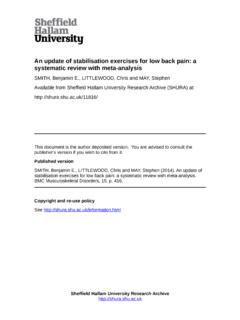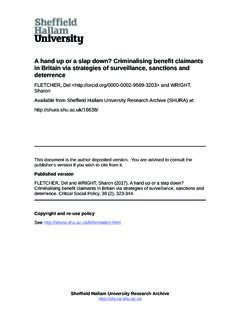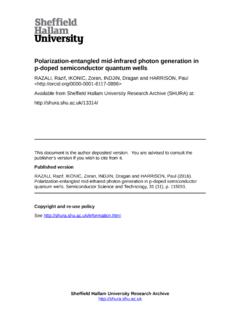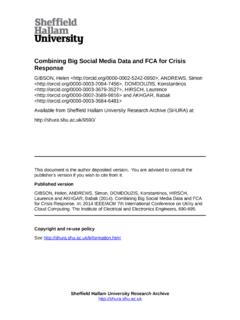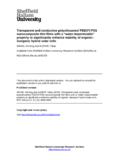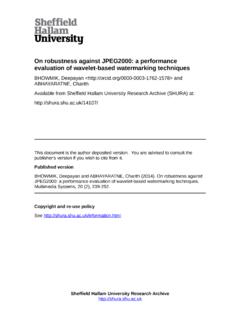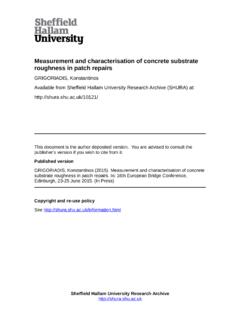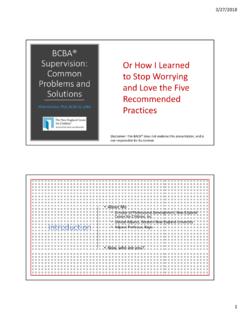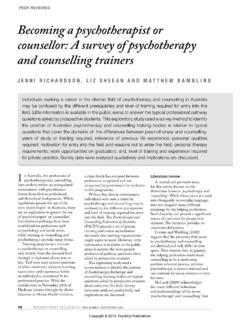Transcription of Chasing the accreditation dream : do employers …
1 Chasing the accreditation dream : do employers value accredited journalism courses CANTER, Lily < >. Available from Sheffield Hallam University Research Archive (SHURA) at: This document is the author deposited version. You are advised to consult the publisher's version if you wish to cite from it. Published version CANTER, Lily (2015). Chasing the accreditation dream : do employers value accredited journalism courses. Journalism Education : The Journal of the Association of Journalism Education, 4 (1), 40-52. Copyright and re-use policy See Sheffield Hallam University Research Archive Dr Lily Canter Lecturer in Journalism Sheffield Hallam University Cantor Building 153 Arundel Street Sheffield S1 2NU. 0114 225 6813. 1. Chasing the accreditation dream : Do employers value accredited journalism courses or are higher education institutions pursuing an archaic endorsement scheme? Dr Lily Canter Abstract A third of the UK's 300 undergraduate and postgraduate journalism courses are accredited by at least one of the main accreditation bodies (NCTJ, BJTC, PPA) illustrating the marketing value universities place on such schemes in an increasingly competitive marketplace.
2 Yet questions continue to be raised amongst academics and practitioners over the ongoing value and relevance of such accreditation schemes in a diversifying industry which currently places great emphasis on digital skills. This exploratory research is the first independent study to date to examine the value of accreditation to employers via interviews with 14 editors representing all sectors of the industry. The findings depict a changing landscape where writing skills and digital skills are held in equal regard and work experience takes precedent over qualifications. It also reveals that accreditation is not a key factor in the employment of entry level journalists. KEYWORDS: accreditation ; journalism; education; employment; digital skills;. professionalisation 2. Introduction Former Sun newspaper editor Kelvin MacKenzie publically decreed in 2011 that he would "shut all the journalism colleges down" and there was "no merit" in going to university if young people wanted to become a print journalist (MacKenzie, 2011).
3 Instead he advocated getting a job on a local newspaper and learning from firsthand experience. What MacKenzie failed to acknowledge was that the era of the singular print journalist is over as today trainees must be accomplished in print, online and broadcast skills and furthermore journalism has become a graduate occupation and it is extremely difficult - although not impossible - to enter the industry without an undergraduate or postgraduate degree. Training no longer occurs systematically on the job as industry increasingly relies upon higher education to provide this service. Both of these factors have increased exponentially since MacKenzie made his remarks four years ago. Advice to aspiring journalists given by the Society of Editors (2014) makes it abundantly clear that the vast majority of new entrants to the occupation have degrees and an approved journalism qualification. Data from the Journalists at Work report (Spilsbury, 2013) indicates that 82 per cent of people working as journalists have a degree or higher level qualification compared to 38.
4 Per cent of all employment in the UK, making journalism a highly qualified occupation. Yet in 1968 less than 10 per cent of UK journalists were graduates (Boyd-Barrett, 1970). The progression from school leaver to graduate job has occurred at a relatively steady pace in the UK over the last 40 years albeit at a slower rate than in America or parts of Western Europe. The first postgraduate journalism course in the UK was established at Cardiff University - formerly University College Cardiff - in 1970 (Evans, 2014) and more institutions followed suit, with postgraduate programmes in journalism being offered at 27 British universities by 2006. (Hanna and Sanders (2007). Initially the industry was sceptical of "out of touch" graduates, still 3. preferring younger recruits trained at vocational further education courses (Hanna and Sanders, 2007, p405). But this scepticism gradually subsided as the conversion of polytechnics to universities in the late 1980s saw competitive expansion in higher education and the emergence of single honour journalism undergraduate degrees.)
5 Between 1996 and 2005 the number of applicants applying for undergraduate or Higher National Diploma journalism programmes rose by 61 per cent (Hanna and Sanders, 2007) and according to the Universities and Colleges Admissions Service there are currently around 100 single and joint undergraduate degree courses involving journalism and 200 postgraduate (UCAS, 2015). Yet the expansion of journalism training into higher education was initially resisted by the leading accreditation body, the National Council for the Training of Journalists (NCTJ), as they feared such degrees would create an over-supply of journalism recruits to the market (Hanna and Sanders, 2007). But resistance eventually shifted to co-operation and today the NCTJ accredits around 40. undergraduate and postgraduate courses including BA Journalism, BA Broadcast Journalism, MA Magazine Journalism and MA Sports Journalism together with approximately 30 further education and fast track courses (NCTJa, 2015), accounting for 13 per cent of all journalism Bachelor and Masters degrees.
6 Founded in 1951, in response to criticisms levelled at the ethics and training of journalists in the Royal Commission on the Press, the NCTJ is the oldest and most dominant accreditation body in the UK. Now operating as a charity, the NCTJ is regulated by The Office of Qualifications and Examinations Regulation and sets examinations for its Diploma and National Qualification in Journalism. In 2013 nearly two thirds of journalists held a journalism qualification, with the most common qualification being the NCTJ which accounted for 73 per cent of all journalism qualifications (Spilsbury, 2013) meaning that just under half of all working journalists had an 4. NCTJ qualification. Initially funded by industry and strongly supported by the National Union of Journalists (NUJ), the NCTJ controlled journalism training from the 1950s to the mid 1980s, setting caps on the number of training places in relation to vacancies in the regional press (Cole, 1998).
7 But during the late 1980s and 1990s many newspaper groups withdrew from the NCTJ to set up their own training schemes or to transfer to the National Vocational Qualifications, which attracted public funding (NCTJb, 2015). Meanwhile higher education institutions encroached further into journalism education and "the whole area became a melting pot" (Cole, 1998, p6). During this period the Broadcast Journalism Training Council (BJTC) gained traction having previously operated as an advisory council for the training of radio journalists. In 1980 the BJTC. became a formal partnership between universities and UK broadcasters such as BBC, ITV, ITN, Associated Press, Sky News, Channel 4 News and Reuters to accredit training schemes and maintain professional standards. Although it also holds charity status, in contrast to the NCTJ the BJTC does impose a single prescriptive syllabus on training providers and has no involvement in examinations but instead "encourages institutions to set examinations and assessment regimes which reflect current best practice and industry requirements" (BJTC, 2015).
8 It currently accredits more than 50 higher education courses, 17 per cent of the 300 listed by UCAS. Meanwhile the Professional Publishers Association (PPA), which evolved out of the historic Society of Weekly Newspapers and Periodical Proprietors, dating back to 1913, began accrediting higher education courses in 2011 (PPA, 2011) and currently accredits almost 20. undergraduate and postgraduate courses, representing seven per cent of all journalism higher education courses. The organisation, which represents 220 companies, ranging from consumer and customer magazines to business-to-business data and information providers is a forum and membership scheme for the magazine publishing industry. 5. Whilst it is possible for a course to be accredited by all three bodies most institutions choose the scheme which suits their specialism whether it be print, broadcast or magazine journalism (Frost, 2012). In such a busy and expansive marketplace accreditation is an attractive added value' for journalism degree applicants and as such is viewed by universities as a valuable marketing tool.
9 As a result, currently a third of higher education journalism courses are accredited by at least one of the three bodies. The same value is also placed upon accreditation in university business schools where those who are accredited see it as a valuable distinguishing mark for high quality provision and one which enhances demand and the fees that may be charged, (Locke, 1999, p75). However there is no evidence in the UK to support the assumed applicant perception that accredited degrees are superior' to unaccredited degrees. Furthermore there is a significant lack of independent research into whether employers themselves value graduates from accredited courses over those from non-accredited courses. The emphasis on employability is a growing factor in UK universities with graduate employment rates featuring in league tables (The Guardian, 2015; The Complete University Guide, 2015) and the employability agenda creating a climate of "education for employment's sake" (Sarson, 2013).
10 But enhancing employability within journalism is dependent upon students being prepared with the relevant skills and expertise. With the growth of interest in digital and broadcast media, higher education institutions are faced with the question of whether or not accreditation schemes are relevant to employability and career progression and if indeed there is any correlation between accreditation and graduate employment rates. Some journalism scholars and educators (Heseltine, 2010;. McNair, 2010) argue that student employability is no longer dependent on accreditation in an era of rapid globalisation and digitalisation and these bodies are no longer providing the necessary skills that industry requires. This research project therefore seeks to address this unchartered 6. field of inquiry via an exploratory study to identify the value of accreditation schemes to employers and the factors higher education journalism providers should assess when considering accreditation .

